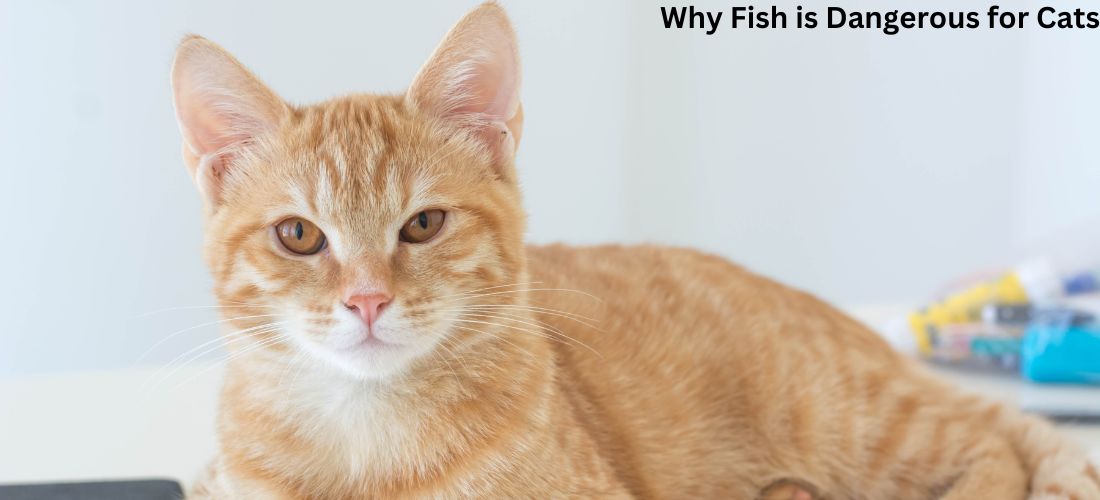Understanding why fish is dangerous for cats is crucial for responsible pet ownership. While many feline companions enjoy the taste of fish, it can pose significant health risks if not carefully managed. From nutritional imbalances to potential contaminants like mercury, fish presents several hazards that can affect a cat’s well-being. In this article, we’ll explore these dangers in detail, providing insights into why moderation and careful consideration are essential when offering fish to your furry friend.”
Benefits and Dangers of Feeding Fish to Cats
Feeding fish to cats can have both benefits and dangers. While cats love the taste of tuna and other fish, it is important to be cautious. Many cats are allergic to fish and it can lead to urinary tract blockages if they eat too much fish. Fish is good for cats in moderation, as it is high in phosphorus which is important for their diet. However, fish is not a natural part of a cat’s diet. It is safer to stick to pet food specifically made for cats rather than raw fish or fish-based foods.
Benefits of Feeding Fish to Cats:
Feeding your cat fish can provide a variety of benefits to their health. Many cats develop urinary tract infections, and the protein found in fish can help prevent these issues. Fish is a great source of protein, which is essential for your cat’s overall health and well-being. Omega-3 fatty acids are also present in fish, which can help with your cat’s skin and coat health. Feeding your cat fish can also add variety to their diet, as opposed to just sticking to traditional dog food. Just make sure to not feed it to your cat too often, as some fish used in canned pet foods can have dyes added to them to make their flesh look more appealing for human consumption.
Dangers of Feeding Fish to Cats:
Dangers of Feeding Fish to Cats:
When considering feeding fish to cats, it’s important to be aware of the potential dangers that can arise. While fish may seem like a natural choice for feline diets, there are some risks to be mindful of. Fish are often at the top of the food chain, meaning they can contain higher levels of toxins and heavy metals. Some predatory fish, like tuna, can be high in phosphorus and magnesium, which can lead to nutritional imbalances in cats. Additionally, fish farms may use dyes to make their flesh appear more appealing, which can be harmful to your cat.
Nutritional Imbalance:
Feeding your cat too much fish can result in a nutritional imbalance, as fish may lack essential nutrients such as vitamin K that cats need. Additionally, certain kinds of fish like albacore tuna per week can be high in phosphorus and magnesium, which can lead to health issues.
Thiamine Deficiency:
Canned tuna and other fish flavored cat foods may not provide enough thiamine for your cat, leading to a deficiency. Thiamine is an essential nutrient that cats cannot produce on their own, making it crucial to ensure they are getting enough in their diet
Gastrointestinal Upset:
Some cats may experience gastrointestinal upset after consuming fish, especially if they are not used to it. Fish that are condemned for human consumption may be used in cat foods, which can lead to digestive issues in sensitive cats. It’s important to be cautious and selective when introducing fish into your cat’s diet.
Feeding Fish to Your Cat
Feeding fish to your cat can be a great source of protein and healthy fats for your feline friend. However, it’s important to be cautious about the types of fish you feed them. A serving of albacore tuna per week is generally safe, but never give your cat canned cat foods containing menadione, a synthetic form of vitamin K that can be harmful. The levels of heavy metals in canned cat foods made with farmed fish may also be a concern.
Some cat owners may recommend feeding organic standards for fish to their cats, as they may have lower levels of heavy metals and other toxins. The FDA advises women of child-bearing age and children to avoid cat food containing menadione, as it can be toxic. It’s essential to be mindful of the ingredients in the cat foods you choose, as they can impact the development and overall health of your feline companion.
Is it okay for cats to eat fish every day?
Cats love fish and cats can eat fish regularly, but it is not recommended to feed them fish every day. Cats with a history of urinary tract disorders should especially avoid a daily fish diet. Fish eaten by cats may contain high levels of mercury, which can be toxic. The FDA advises children to avoid them entirely to prevent any health risks. Fish move up the food chain, including bigger fish, posing a potential danger to your pet cats if consumed daily.
Fish is one of the foods your cat may enjoy, but it should not be the main component of their diet. Even though fish is a good source of protein and vitamin K, vitamin K from most food sources may not be present in large enough quantities to meet your cat’s needs. The feeding of fish-based cat foods and the development of dry cat food products made with farmed fish can be included in your cat’s diet occasionally, but not every day.
Is fish food toxic to cats?
Is fish food toxic to cats? Cat parents may wonder if feeding fish to their feline friend is a good idea. While cats may enjoy the taste of tuna and salmon, it is recommended to limit to 1 serving of albacore tuna per week due to the potential link between the feeding of fish and urinary tract disorders or kidney issues. Adding whole fish or fish as an ingredient to cat foods can be risky, as it may contain common feline food allergens or be toxic that the FDA advises against feeding to cats.
Can domestic cats eat fish?
Can domestic cats eat fish? Many cats like to eat the fish and it is often added to cat foods. However, too much fish in a cat’s diet can lead to urinary tract infections and blockages. It is not always a good idea to feed fish to your cat’s on a regular basis.
Why is fish dangerous for cats?
Nutritional Deficiencies: Consuming fish can lead to taurine deficiencies in cats, as fish does not contain this important amino acid that is crucial for their heart health. Additionally, fish lacks vitamin E which can result in vision problems for cats in the long run.
Why is fish not good for cats?
Fish is not good for cats as it lacks essential nutrients necessary for their overall health. It can also lead to deficiencies in vital vitamins and minerals, especially if fed as the main source of protein. Additionally, fish may contain high levels of mercury, which can be harmful to cats if consumed in excess.
What About Fish Oil For Cats?
Many pet owners may wonder about the benefits of fish oil for cats. Fish oil is a good source of omega-3 fatty acids, which can help improve a cat’s skin and coat health, reduce inflammation, and support overall heart and brain health. While some commercial cat foods may already contain fish oil as an ingredient, adding extra fish oil to your cat’s diet can be beneficial, especially for cats with skin issues or joint problems. However, it’s important to consult with your veterinarian before adding any supplements to your cat’s diet to ensure they are safe and appropriate for your pet’s individual needs. .
How To: Safely Feed Fish To Your Cat
Choosing Safe and Suitable Fish:
Choosing safe and suitable fish for consumption is important to ensure you are getting high-quality, nutritious seafood. Look for wild-caught or sustainably farmed options to avoid harmful chemicals and additives. Check for freshness and proper storage to avoid foodborne illnesses.
Final thoughts about why fish is dangerous for cats?
While fish may seem like a tempting treat for cats, its potential dangers—such as nutritional deficiencies, mercury contamination, and the risk of thiamine deficiency—underscore the importance of moderation and careful consideration in their diet. Consulting with a veterinarian ensures your cat’s health and well-being are prioritized.

